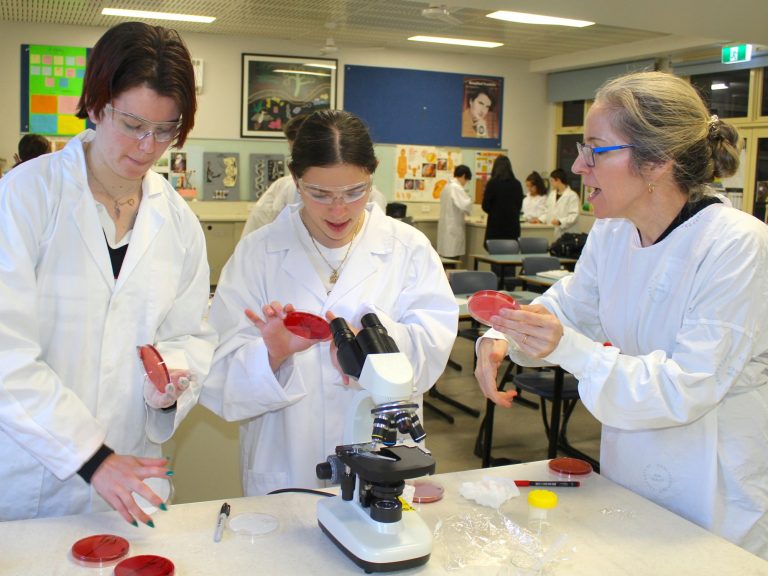In one of the HSC and IBDP July holiday workshops presented to Year 12 the students of Biology had the immense good fortune of a two-hour visit from a very busy NSW Health pathologist/microbiologist who has spent the months since March focused on the stressful and time-consuming work of COVID-19 testing.
Dr Catherine Pitman, also a Santa mum (her daughter Kate is in Year 7), extended the girls’ learning about infectious diseases, particularly COVID-19. She spoke to them about the challenges and ‘trying times’ of the surge capability testing, the logistics of obtaining rare testing supplies and equipment as well as the importance of strict hygiene protocols in the clinical laboratories.
Year 12 Biology student Ailish McDonagh commented that Dr Pitman shared important insights not only into Biology syllabus but also ‘shed light on confusion and misunderstanding surrounding the prevailing circumstances of COVID-19 with enthusiasm and undeniable expertise’.
Dr Pitman’s PowerPoint presentation on ‘A day in the life of a pathology sample for COVID-19 testing’ was of particular interest. Dr Pitman is an expert on coronaviruses having also worked on SARS in 2003 in Pacific Islander countries and elsewhere. The students gained many insights into the pandemic as well as into infectious diseases more generally. They immersed themselves in a hands-on session examining de-identified samples of real-life swabs (not COVID-19!) brought along by Dr Pitman.
‘Our newly acquired knowledge was extended through a practical element where we were given the opportunity to use the highest power oil immersion lens with our light microscopes, which is less common in our general biology classes, to examine fixed and stained miniscule samples related to various bacterial infectious diseases’, Ailish said.
‘Further, using two different petri dishes – one for growing broad spectrum bacterial colonies and the other for more specific gram negative bacteria – we tested our inoculation techniques in culturing the bacteria from our hands via direct contact and through tissues to compare bacterial growth after incubation. We’re all eager for the results regardless of how unsettling they may be!’
Other school holiday workshops eagerly attended by Year 12, who chose to opt in, included extra mentoring and consolidation of learning in the subjects Chemistry, Drama, IPT, Visual Arts, Studies of Religion, English, Ancient History, Modern History, Physics, Textiles & Design, Literature, Music, Design & Technology, PDHPE, Italian, Japanese, IPT, Maths, French, Economics and Legal Studies.



